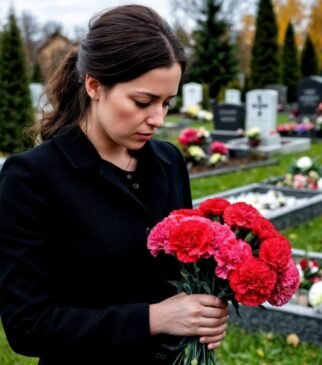Late autumn. The wind lashes against shoulders, swirling fallen leaves among the tombstones. The sky hangs low and gray, like a hospital sheet left to dry. The cemetery feels abandoned: no voices, no movement—just withered grass and heavy silence. By one grave stand three figures. Maria is rooted in place, yet inside her, only emptiness.
Her hands, wrapped in black gloves, are clenched tightly; her face is pale, eyes frozen. She wears a simple dark coat, topped with a strikingly bright hat pulled low over her brows. Everything about her seems frozen, as if her heart had already been buried with the small wooden coffin. Nearby stand Asya and Lena—both younger, both a little lost, yet trying to stay close. Asya sobs quietly, wiping tears with a handkerchief. Lena’s face is hard as stone, as if furious at the world for this moment.

The priest quickly utters words, the wind tears fragments of the prayer away and carries them off. A man with a shovel — one of those who work for pennies — buries the coffin without looking. Each strike of the clumps of earth on the coffin lid echoes in Marina’s chest with a dull ache.
She does not cry. Does not move. Only her pale lips betray the tension.
“All done, Masha… all done,” Asya whispers, taking her hand.
Maria slowly turns her head. Her lips tremble, but no words come. Only a question in her eyes: why? Too soon. Too terrible. Too unfair. Beneath the ground lies the girl she had waited for so long, whom she sang to even before birth, bought the first dress for, and chose a name. A name that now no one will say aloud.



